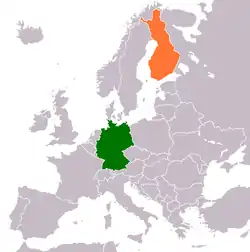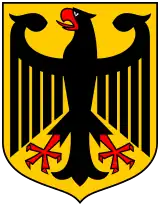 | |
Germany |
Finland |
|---|---|
| Diplomatic mission | |
| Embassy of Germany, Helsinki | Embassy of Finland, Berlin |
Finland–Germany relations are the bilateral relations between the Finland and Germany. Both countries are part of the European Union, are signatories of the Schengen Agreement, and are members of the eurozone and NATO. Germany supported Finland's NATO membership during Finland's accession into NATO, which was finalized on 4 April 2023.[1]
History

.jpg.webp)

Relations between both nations began after the German Empire recognised the newly independent Finnish state on January 4, 1918. In the ensuing Finnish Civil War, Germany played a prominent role siding with the White Army and training Finnish Jägers.[2] In one of the decisive battles of the war, German troops took Helsinki in April 1918.[3]
During World War II, the secret protocol in Molotov–Ribbentrop pact enabled the Winter War (1939–40), a Soviet attack on Finland. Finland and Nazi Germany were "co-belligerents" against Soviet Union during the Continuation War (1941–44), but a separate peace with Soviet Union led to the Finnish-German Lapland War (1944–45).
Finland recognised both the Federal Republic of Germany and the German Democratic Republic (West and East Germany) in 1972 and it established diplomatic relations with East Germany in July 1972 and with West Germany in January 1973.[4] In July 2022, Germany fully approved Finland's application for NATO membership.[5]
Resident diplomatic missions
Finland also has a consulate general in Hamburg, two honorary consulates general in Düsseldorf and Munich and other honorary consulates in Bremen, Dresden, Frankfurt am Main, Hanover, Kiel, Lübeck, Rostock, Stuttgart and Wilhelmshaven. Germany also has an honorary consulates in Joensuu, Jyväskylä, Lappeenranta, Mariehamn, Oulu, Rovaniemi, Tampere, Turku and Vaasa.
_(6298294868).jpg.webp) Embassy of Finland in Berlin
Embassy of Finland in Berlin Embassy of Germany in Helsinki
Embassy of Germany in Helsinki
See also
References
- ↑ "Germany backs Sweden and Finland's potential NATO membership bids". euractiv.com. 2022-05-03. Retrieved 2022-05-28.
- ↑ John Horne, ed. (2011). A Companion to World War I. John Wiley & Sons. p. 561. ISBN 9781118275801.
- ↑ "Apr 13, 1918: Germans capture Helsinki, Finland". History.com. Archived from the original on 21 May 2013. Retrieved 30 November 2012.
- ↑ Leatherman, Janie (2003). From Cold War to Democratic Peace: Third Parties, Peaceful Change, and the OSCE. Syracuse University Press. pp. 97–102. ISBN 9780815630326.
- ↑ "Germany ratifies NATO membership for Finland, Sweden". www.reuters.com. Retrieved 2022-07-08.
Further reading
- Cohen, William B., and Jörgen Svensson. "Finland and the Holocaust." Holocaust and Genocide Studies 9.1 (1995): 70-93.
- Hentilä, Seppo. "Maintaining neutrality between the two German states: Finland and divided Germany until 1973." Contemporary European History 15.4 (2006): 473-493.
- Holmila, Antero. "Finland and the Holocaust: A reassessment." Holocaust and Genocide Studies 23.3 (2009): 413-440. online
- Holmila, Antero, and Oula Silvennoinen. "The Holocaust Historiography in Finland." Scandinavian Journal of History 36.5 (2011): 605-619. online
- Lunde, Henrik O. Finland's War of Choice: The Troubled German-Finnish Coalition in World War II (Casemate, 2011).
- Rusi, Alpo. "Finnish-German Relations and the Helsinki-Berlin-Moscow Geopolitical Triangle." in The Germans and Their Neighbors (Routledge, 2019) pp. 179-198.
- Tarkka, Jukka. Neither Stalin nor Hitler : Finland during the Second World War (1991) online
- Vehviläinen, Olli. Finland in the second world war: between Germany and Russia (Springer, 2002).

